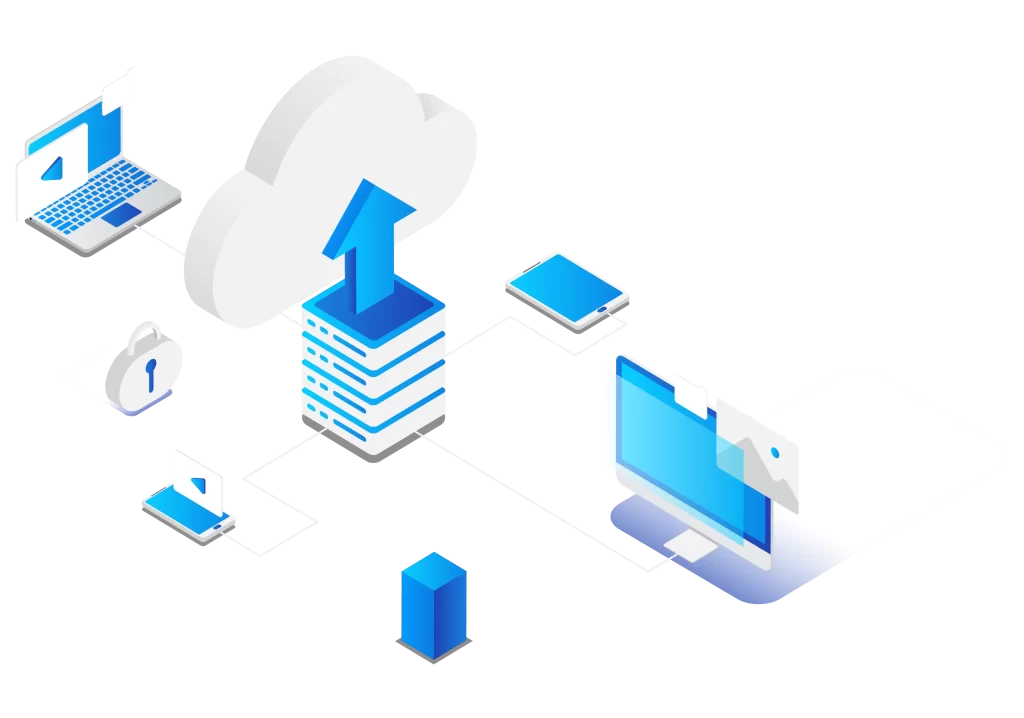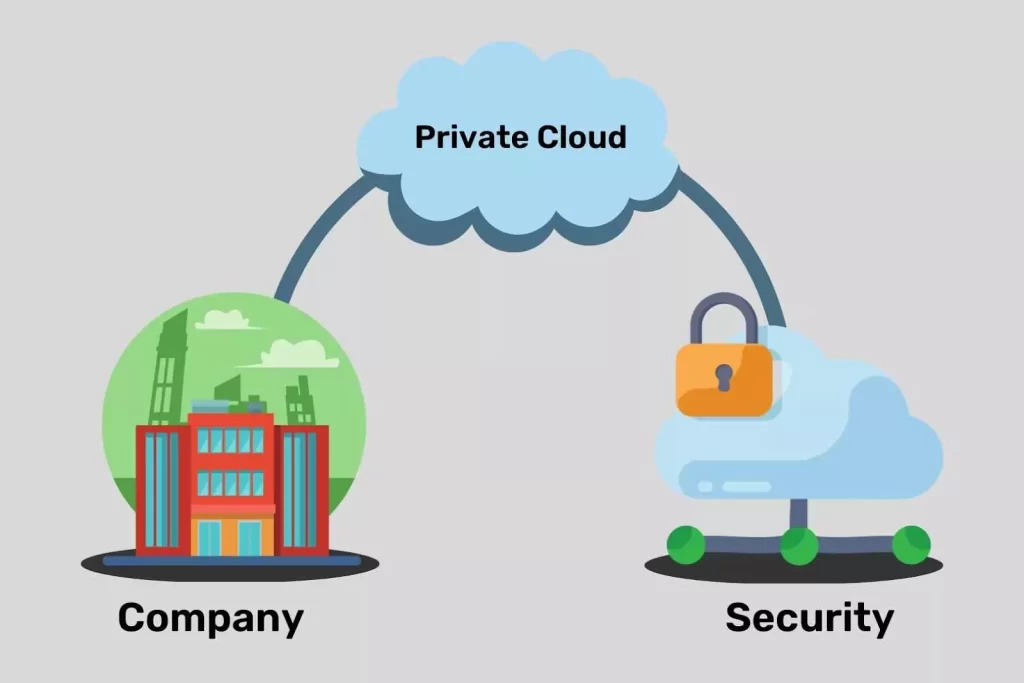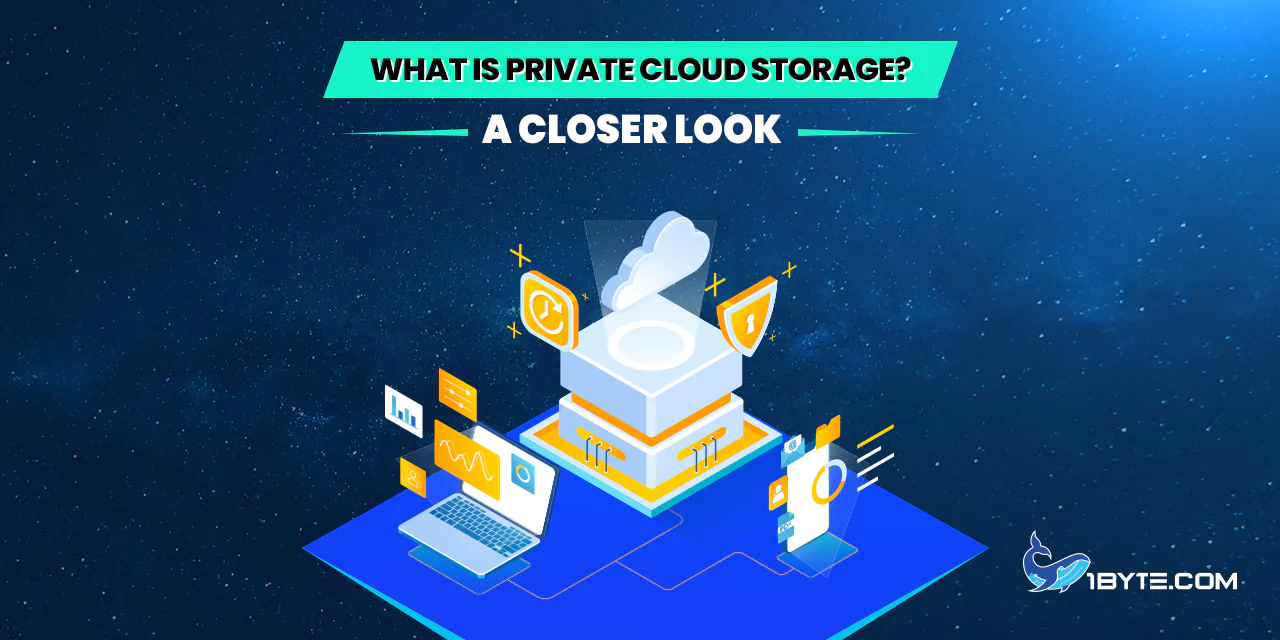Are you wondering, “What is private cloud storage?” In this article, we’ll delve into the world of private cloud storage to provide a clear and concise understanding of this technology.
Private cloud storage, often abbreviated as PCS, is an advanced solution for data storage. Unlike traditional data storage methods, PCS offers a unique approach to managing and storing your data.
In this article, we at 1Byte will explore the key features and benefits of private cloud storage. By the end, you’ll have a solid grasp of what private cloud storage is and how it can benefit both individuals and businesses. So, let’s begin our journey into the world of PCS.
What is Private Cloud Storage?
Private cloud storage, often abbreviated as PCS, is a cutting-edge data storage solution. This section will unravel the core concepts of private cloud storage, shedding light on its importance and functionality.
Imagine having your data stored securely, but with more flexibility and control than traditional methods. With PCS, this is the reality. Let’s dive deeper into this innovative technology to understand it better.
FURTHER READING: |
| 1. A Guide to Effective Cloud Orchestration |
| 2. What is Cloud Networking? |
| 3. What is Container Orchestration? |
Definition of private cloud storage
Private cloud storage is an innovative data management solution. This subsection defines what private cloud storage is and why it matters.
Private cloud storage, also known as PCS, is a data storage model. It is designed to offer users a secure, scalable, and customizable storage environment. With PCS, data is hosted on infrastructure that is used by a single organization, providing control and privacy.
Unlike public cloud services that serve multiple customers, PCS is dedicated to a single user or organization. This exclusivity ensures that your data remains confidential and protected from unauthorized access. Essentially, private cloud storage is like having your own secure data haven.
One key aspect of private cloud storage is that it can be located on-premises within an organization’s data center or hosted by a third-party provider. This versatility allows businesses to choose the deployment model that aligns with their specific needs.
Key features and characteristics

Let’s explore the key features and characteristics of private cloud storage, shedding light on what sets it apart.
- Data Control: With private cloud storage, users have full control over their data. This means they decide how it’s stored, managed, and accessed.
- Enhanced Security: Security is paramount. Private cloud storage offers a higher level of data security, as it’s not shared with others.
- Customization: Users can tailor the storage environment to their unique needs. This adaptability ensures efficient data management.
- Scalability: Private cloud storage can grow as your data needs expand. It’s a scalable solution, adapting to your organization’s evolving requirements.
- Reliability: Private cloud storage often comes with high availability and reliability, minimizing downtime and data loss.
- Performance: It offers exceptional performance due to dedicated resources, ensuring speedy access to your data.
- Compliance: For organizations with specific compliance requirements, private cloud storage is a compliant-friendly choice.
- Data Privacy: Data remains within the organization’s boundaries, ensuring data privacy and compliance with regulations.
- Cost Control: Users can manage costs effectively by scaling resources as needed, avoiding unnecessary expenses.
Understanding these features and characteristics is essential to grasp the benefits and potential of private cloud storage. It’s a versatile solution that can align with a wide range of business requirements.
Advantages of using private cloud storage
Let’s now explore the advantages of using private cloud storage, shedding light on why it’s a valuable choice.
- Enhanced Security: Private cloud storage offers robust security, keeping data safe from unauthorized access or breaches.
- Customized Control: Users have the power to tailor the storage environment according to their unique needs, providing a high level of control.
- Scalability: It easily adapts to changing storage needs, making it a cost-effective solution.
- Reliability: Private cloud storage often comes with high availability, ensuring data access when it’s needed most.
- Performance: Users experience faster data access and efficient operations due to dedicated resources.
- Compliance: It’s ideal for organizations with strict regulatory requirements, ensuring data is stored in a compliant manner.
- Data Privacy: With data stored within the organization’s boundaries, data privacy is maintained.
- Cost Efficiency: Users can optimize costs by adjusting resources as needed, avoiding unnecessary expenses.
- Disaster Recovery: Private cloud storage provides a robust backup and disaster recovery solution, ensuring data is protected.
- Flexibility: It accommodates diverse business needs, making it suitable for a wide range of industries.
- Data Sovereignty: Data remains within the organization’s control and jurisdiction, reducing legal and privacy concerns.
- Hybrid Solutions: Private cloud storage can be integrated into hybrid cloud setups, offering flexibility in data management.
Knowing the advantages of private cloud storage helps users realize the benefits of private cloud storage and why it’s a compelling choice for organizations seeking secure and customizable data management solutions.
How Does Private Cloud Storage Work?
To truly grasp the essence of private cloud storage, it’s essential to understand how this innovative technology operates. This section will provide a clear and straightforward explanation of how private cloud storage works, shedding light on the processes that make it function effectively. By the end, readers will have a comprehensive understanding of the inner workings of private cloud storage and how it can be harnessed for secure and efficient data management. So, let’s dive into the mechanics of this advanced storage solution.
The underlying technology

The underlying technology behind private cloud storage is virtualization. This technology is pivotal in understanding how private cloud storage operates.
Virtualization abstracts IT resources from their physical hardware, creating flexible resource pools for computing, storage, memory, and networking. These resources are then allocated to various virtual machines (VMs), containers, and other virtualized elements.
This abstraction of physical hardware allows for maximum hardware utilization. It efficiently shares hardware across multiple users and applications, enabling the scalability, agility, and elasticity that defines cloud computing.
In essence, virtualization is the backbone of private cloud storage, enabling the creation of a secure and efficient data storage environment.
Security measures in private cloud storage
Security measures in private cloud storage are essential to protect data accessibility, privacy, and integrity.
- Encryption: All data in private cloud storage is encrypted, and only the user holds the encryption key. This end-to-end encryption ensures data is secure from the moment it leaves the user’s device.
- Intrusion Detection Systems (IDS): IDS systems continuously monitor network traffic for any signs of suspicious activity and promptly issue alerts when such activity is detected.
- Firewalls: Traditional firewalls and intrusion prevention systems are deployed, although some are evolving to a workload-based security model for better protection.
- Access Control: Private cloud storage providers offer a range of access control capabilities, giving users control over who can access and manage their data.
- Regular Audits: Periodic audits are conducted to identify and address vulnerabilities within the system, ensuring data remains secure.
- Multi-factor Authentication (MFA): MFA adds an extra layer of security by confirming a user’s identity with both a password and a second factor, reducing the risk of unauthorized access.
These measures collectively reinforce the security of private cloud storage, safeguarding data throughout its storage and transfer. They create a protective shield around cloud storage infrastructure, networks, and endpoints, ensuring data remains confidential and secure.
Scalability and flexibility
Scalability and flexibility are two key elements that define how private cloud storage works.
- Scalability: Private cloud storage is designed to grow with an organization’s data needs. Users can easily scale up or down, adding or removing resources as necessary. This flexibility ensures that an organization can efficiently manage its data without incurring unnecessary costs.
- Resource Pooling: Private clouds use resource pooling, allowing computing, storage, memory, and networking resources to be allocated and shared among different virtual machines, containers, and other virtualized elements. This dynamic resource allocation contributes to the scalability of private cloud storage.
- Workload Adaptation: Private cloud storage adapts to the workload demands of an organization. It can handle increased data loads during busy periods and scale down during quieter times, optimizing resource utilization.
- Efficiency: The ability to efficiently use resources helps reduce waste and results in cost savings. Users can align their resource allocation with their specific needs, making private cloud storage a cost-effective solution.
- Flexibility: Private cloud storage offers the flexibility to choose between different types of private clouds, including virtual private clouds, managed private clouds, hosted private clouds, and on-premise private clouds. This flexibility enables organizations to select the deployment model that best suits their requirements.
In summary, scalability and flexibility are integral to how private cloud storage operates. They allow organizations to tailor their storage environment, adapt to changing data needs, and manage resources efficiently, ensuring that data remains accessible and cost-effective.
Use Cases for Private Cloud Storage
Understanding how private cloud storage can be applied in real-world scenarios is key to appreciating its versatility and benefits. In this section, we’ll explore various use cases that demonstrate the practical applications of private cloud storage. These examples will shed light on how organizations and individuals can harness this technology to meet their specific data storage needs effectively. Let’s dive into the real-world applications of private cloud storage to see how it can make a difference.
Business applications

Business applications of private cloud storage are diverse and offer substantial value to organizations:
- Data Backup and Recovery: Private cloud storage serves as a reliable backup solution, protecting crucial business data from unforeseen hardware failures or disasters. It safeguards various data types, from documents to multimedia assets.
- Collaboration: Real-time collaboration is streamlined through private cloud storage, enhancing team productivity. Team members can work on shared files and documents simultaneously, fostering efficiency.
- Archiving: Businesses can leverage private cloud storage for archiving data that is not in current use but must be retained for future reference or compliance purposes.
- Disaster Recovery: In the face of a disaster, private cloud storage ensures swift data recovery, minimizing downtime and associated costs.
- Scalability: Private cloud storage allows businesses to effortlessly adjust their storage capacity, optimizing costs by paying only for the storage they need.
- Security: Private clouds offer advanced security measures, such as encryption and robust access controls, making them an ideal choice for safeguarding sensitive business data.
In the ever-evolving landscape of cloud storage, businesses can choose from a range of providers like Microsoft OneDrive, Dropbox, IDrive, Nextcloud, and others, each offering tailored features designed to meet their unique requirements. These platforms incorporate advanced security, collaboration tools, and extensive storage options, making them valuable assets for businesses in 2023.
Personal use cases
Private cloud storage presents several practical personal use cases, making it a valuable asset for individuals:
- Data Backup and Recovery: Individuals can rely on private cloud storage to back up vital personal data, creating a safety net for unforeseen hardware failures or unexpected events. This covers a wide range of personal documents, records, and digital assets, including images and videos.
- Collaboration: Private cloud storage fosters real-time collaboration among family members or friends. Users can seamlessly share files and collaborate on documents simultaneously, enhancing productivity and efficiency.
- Archiving: For items not currently in use but needing preservation for future reference, individuals can employ private cloud storage for archiving.
- Accessibility: The convenience of accessing crucial files from anywhere with an internet connection is a significant advantage, making private cloud storage an appealing choice over local storage.
- Security: Private clouds offer robust security features, including encryption and strong access controls, making them a suitable option for safeguarding sensitive personal data.
- IoT Data Storage: Storing CCTV camera footage and IoT logs within one’s home is made easier through private cloud storage.
- File Sharing: It enables the sharing of images from Android to iPhone without the need for third-party applications.
- Local Caching Server: Private cloud storage can also serve as a local caching server, enhancing data retrieval and storage efficiency.
Industry-specific scenarios
Private cloud storage can be adapted to meet the specific needs of various industries. Here are some examples:
- Financial Services: Financial institutions can leverage private cloud storage to modernize their financial systems and enhance risk management. They can securely store sensitive financial data in a private cloud, ensuring compliance with industry regulations.
- Government: Government agencies can implement private cloud storage for remote access, enabling cross-agency collaboration and secure service delivery. For instance, a private cloud can securely store sensitive data, such as citizen records, accessible to various departments.
- Healthcare: In the healthcare sector, private cloud storage can improve patient engagement, facilitate provider collaboration, and provide insights into operations. It ensures the secure storage of patient records, medical images, and other sensitive health information.
- Manufacturing: Manufacturers can utilize private cloud storage to safeguard proprietary designs and intellectual property. It also supports enhanced collaboration among manufacturing units in different geographical locations.
- Data Backup and Collaboration Companies: Independent software vendors in data backup, collaboration, big data analytics, and industry-specific areas like healthcare increasingly embrace private cloud storage.
The flexibility and security of private cloud storage make it suitable for a wide array of industries, offering tailored solutions to meet their specific data management requirements.
Leverage 1Byte’s strong cloud computing expertise to boost your business in a big way
1Byte provides complete domain registration services that include dedicated support staff, educated customer care, reasonable costs, as well as a domain price search tool.
Elevate your online security with 1Byte's SSL Service. Unparalleled protection, seamless integration, and peace of mind for your digital journey.
No matter the cloud server package you pick, you can rely on 1Byte for dependability, privacy, security, and a stress-free experience that is essential for successful businesses.
Choosing us as your shared hosting provider allows you to get excellent value for your money while enjoying the same level of quality and functionality as more expensive options.
Through highly flexible programs, 1Byte's cutting-edge cloud hosting gives great solutions to small and medium-sized businesses faster, more securely, and at reduced costs.
Stay ahead of the competition with 1Byte's innovative WordPress hosting services. Our feature-rich plans and unmatched reliability ensure your website stands out and delivers an unforgettable user experience.
As an official AWS Partner, one of our primary responsibilities is to assist businesses in modernizing their operations and make the most of their journeys to the cloud with AWS.
Conclusion
In conclusion, private cloud storage is a versatile and secure solution for managing data in various settings, be it for businesses, government agencies, healthcare, manufacturing, or personal use. It offers a range of benefits, including robust security, scalability, and tailored applications for diverse industries. With its ability to protect sensitive data, enhance collaboration, and ensure reliable backup and recovery, private cloud storage has proven its worth in an ever-evolving digital landscape.
As technology continues to advance, private cloud storage stands as a reliable ally in the quest for efficient and secure data management. So, whether you’re safeguarding critical business data or personal memories, understanding what private cloud storage is and how it can work for you is key to harnessing the full potential of this innovative technology.

